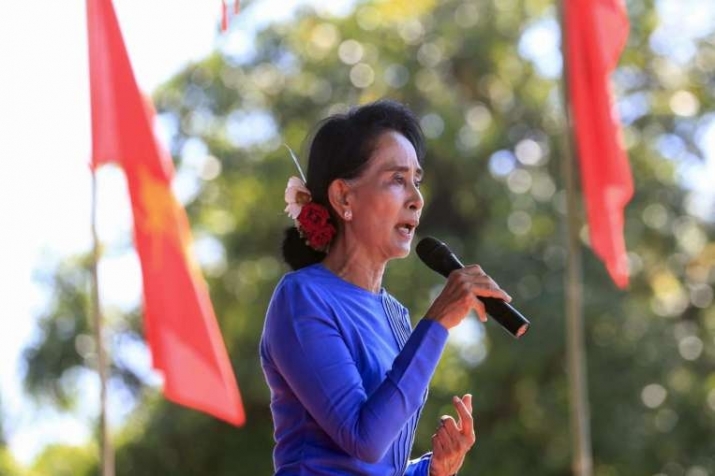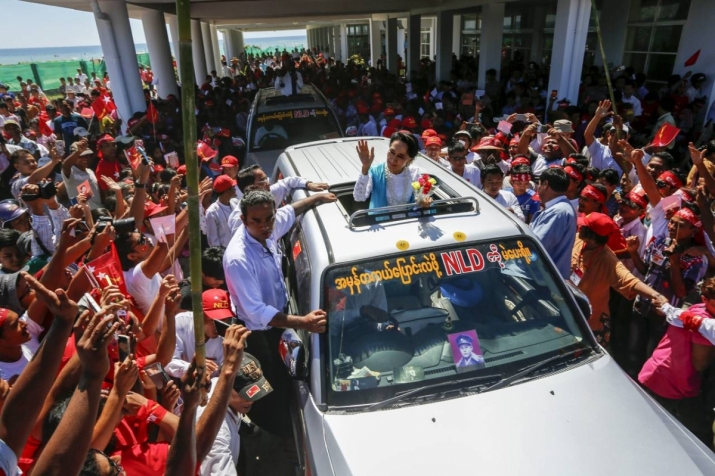NEWS
Aung San Suu Kyi Urges Tolerance and Unity in Myanmar’s Troubled Rakhine State
 Myanmar opposition leader Aung San Suu Kyi campaigns in Thandwe, Rakhine on Saturday. From straitstimes.com
Myanmar opposition leader Aung San Suu Kyi campaigns in Thandwe, Rakhine on Saturday. From straitstimes.comMyanmar opposition leader Aung San Suu Kyi arrived in the country’s restive Rakhine State on Friday for three days of electoral campaigning, aiming to garner voter support and to address the growing religious tensions between Buddhists and Muslims that have characterized the run-up to the national election scheduled for 8 November.
Speaking at a rally, Suu Kyi, a devout Theravada Buddhist, emphasized that it was critical that the country go forward “without discrimination based on race and religion.” (The Straits Times)
Most observers expect Suu Kyi’s National League for Democracy (NLD) party to do well in what is hoped will be Myanmar’s first free and fair elections in decades, and even to push out the military-backed Union Solidarity and Development Party that has ruled Myanmar since 2011. However the NLD also has stiff opposition in the form of the Arakan National Party (ANP), which has been bolstered by rising nationalism and a growing divide between the Buddhist majority and minority Muslim groups.
Speaking before hundreds of supporters in the town of Thandwe, Suu Kyi urged, “All citizens in the union need to unite . . . great hatred and fear does not benefit our country.” She restated recent assertions that her political rivals were using religious exclusion as a campaign tool. “It is very important that all people regardless of race and religion living in our country must be safe. We can have peace in our country only if the people feel safe both mentally and physically,” she said. (The Straits Times)
The Nobel Peace laureate chose not to visit the state capital of Sittwe and other more restive areas of Rakhine in which relations between Muslim Rohingya and ethnic Rakhine Buddhists, who make up more than two-thirds of the state’s population, remain particularly tense. Since 2012, the state has suffered at least two instances of violent unrest between Buddhists and Muslims that have left more than 200 people dead.
 "Mother Suu," as she is affectionately known among supporters, waves as she arrives at Thandwe airport. From wsj.com
"Mother Suu," as she is affectionately known among supporters, waves as she arrives at Thandwe airport. From wsj.comDuring her campaign speeches over the weekend, Suu Kyi pledged that an NLD government would improve infrastructure, promote increased agricultural productivity in Rakhine, and ensure that the local population would benefit more from tourism. “Without peace and security, a country cannot prosper,” she said, emphasizing that religious conflict would only undermine economic development. (Nikkei Asian Review)
Myanmar’s government classifies Rohingya Muslims as stateless foreign migrants even though they have lived in Myanmar for generations. They are barred from contesting the election or even voting. The country’s population also includes Muslims from other ethnic groups. According to the Washington, DC-based Pew Research Center, Buddhists make up about 80 per cent of Myanmar’s population of some 52 million, and Muslims just 4 per cent.
Religious tensions have simmered in Myanmar for almost half a century of military rule, but came to a head with violent clashes in 2012. The radical nationalist Committee for the Protection of Nationality and Religion (Ma Ba Tha), a collective of hardline Buddhist abbots and influential monks founded in June 2013, has stoked religious division, asserting that Myanmar’s Buddhist population and culture is under threat from Islam. Critics of Ma Ba Tha say the group’s policies are not representative of the country’s sangha, which has 250,000 members according to a government estimate, and do not reflect the essence of Buddhism.
See more
Myanmar's Aung San Suu Kyi calls for unity in Rakhine as Muslims there claim support for her (The Straits Times)
Suu Kyi goes to Rakhine (The Star Online)
Suu Kyi campaigns in hostile territory (Nikkei Asian Review)
Burma elections: Aung San Suu Kyi woos the Muslim vote with call for unity in Rakhine (Independent)
Myanmar election: Aung San Suu Kyi campaigns in contentious Rakhine state (The Guardian)
Myanmar Passes Buddhist Nationalist-backed Bills into Law (Buddhistdoor Global)














